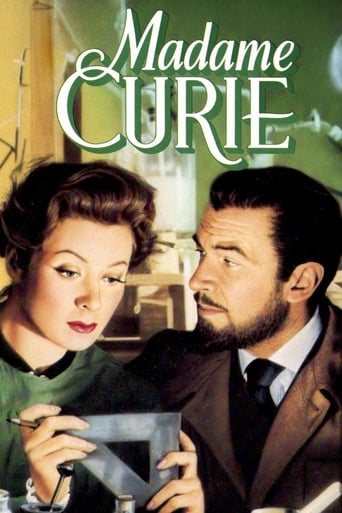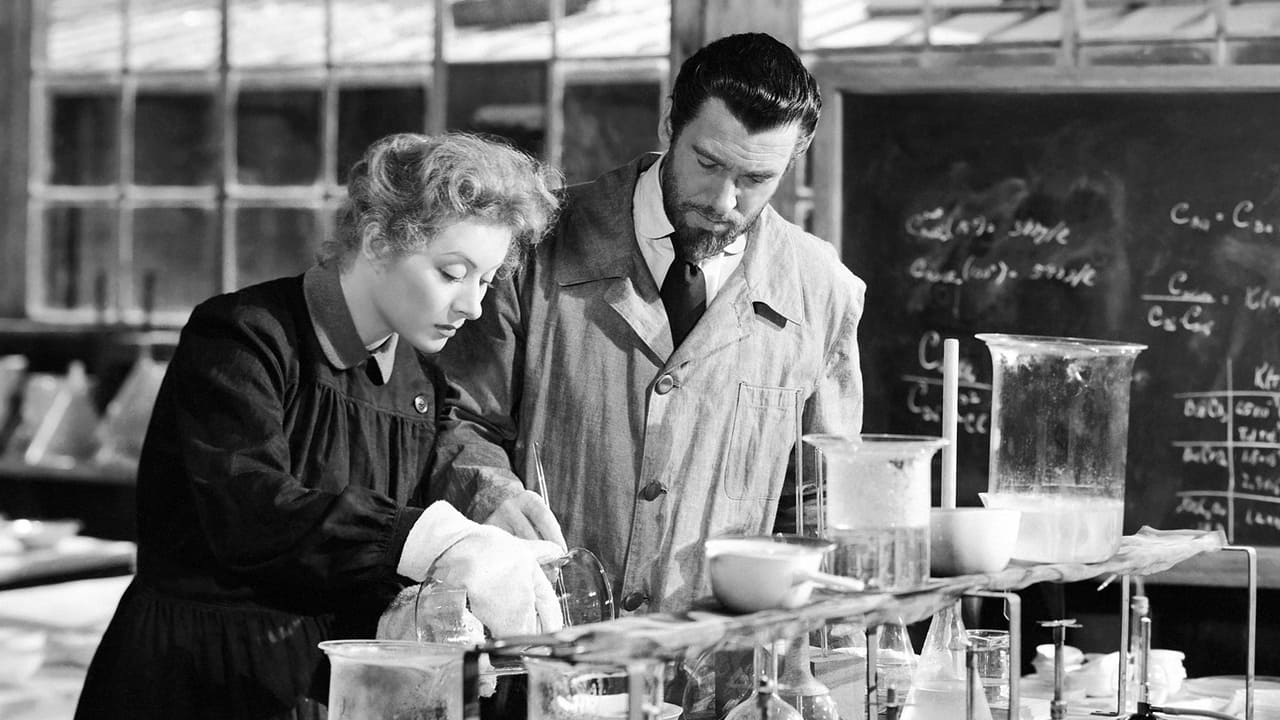Steffi_P
Scientists are one of a number of professions whom over the years Hollywood has mercilessly stereotyped. In the movies, at best they have been charming but out-of-touch boffins, at worst cold-hearted and humourless beings. Madame Curie however is a rarity in that it shows scientific folk as being the dreamy, romantic types that they so often are in real life.Adapted by sci-fi novelist Aldous Huxley and others from the biography by Marie Curie's daughter Eve, the screenplay makes concession to the fact that Hollywood movies are designed for mass consumption. As such the scientific jargon is dumbed down, almost painfully. On the one hand technical talk is skipped over as babble (as in a not-so-discrete dissolve during Marie and Pierre's walk home together when she begins quizzing him over formulae) and, conversely, the protagonists seem implausibly clueless at times (the idea of the Curies dismissing the stain at the bottom of the bowl and taking days to realise it might be radium is laughable). But nevertheless it's impressive and rewarding the way the writers find ways of making real scientific concepts easily digestible, such as the discovery of radium focused in waiting for the right number to appear on a spectroscope.For the two lead roles MGM decided to re-team its star-couple of Greer Garson and Walter Pidgeon, previously seen as Mrs and Mr Miniver in the previous year's Best Picture winner. Sadly they don't compare to their earlier incarnations, the interaction between them veering from wooden to melodramatic. However, as their on screen relationship develops the affection appears very real and touching. These aren't exceptional performances in their own right, but the rapport between the two of them is clear and effective.Thank goodness director Mervyn Leroy has the sense to direct this movie with steady delicacy, with long takes and measured performances giving the story the dignity and also the humanity it requires. There's a particularly nice moment where the Curies are by their daughter's bedside, Walter Pidgeon telling a story to little Margaret O'Brien, Garson sat silent and motionless between them, the camera dollying in, then out, upon her face as the emotion of the moment plays across it.Madame Curie is a far from perfect work, and Hollywood will probably never get science quite right. And yet this picture achieves a quite wonderful thing – a marriage between the magical romanticism of that great movie-making factory, and the equal yet misunderstood allure of scientific endeavour. The common ground exists, and Madame Curie treads it.
wes-connors
Polish science student Greer Garson (as Marie Sklodowska) goes to study in Paris and is accepted as an intern by reserved physicist Walter Pidgeon (as Pierre Curie). Ms. Garson's amazing beauty immediately causes Mr. Pidgeon and young assistant Robert Walker (as David Le Gros) to become distracted in the laboratory, but they grow accustomed to her attractiveness. When Garson graduates, she plans on returning to Poland, but Pidgeon proposes she stay and become "Madame Curie". Garson has noticed an irregularity which leads the couple to discover the element radium...This was a prestige project from MGM, which they secured for Greta Garbo. She telegrammed, "Wonderful plans," but requested a complete manuscript. After some scrambling, there was no complete script. At the time, Garbo felt the roles the MGM offered to her were too repetitive. In hindsight, "Madame Curie" doesn't appear all that different from other Garbo roles, so it may have ended well. Garson and "Two-Faced Woman" (1941) photographer Joseph Ruttenberg certainly showed he would good with Garbo, if she was interested in hiving him another shot. The MGM team shows their usual skill throughout, although the resulting film was less than indicated by seven "Academy Award" nominations.****** Madame Curie (12/15/43) Mervyn LeRoy ~ Greer Garson, Walter Pidgeon, Albert Bassermann, Robert Walker
pmknotts
I'm the first to admit I knew little about Marie Curie until watching "Madame Curie" on Turner Movie Classics today. I knew she was a renowned French scientist long before women were accepted in such fields.Madame Curie--as a historical drama--succeeds in telling her incredible and painstaking contributions to science in the discovery of Radium. The story never lulls, not even for one minute. This film succeeds in providing a unique perspective of the sacrifice and dedication great scientists of all generations have put forth for the betterment of all mankind. Perhaps more surprising to me was how this movie moved me to tears due to the artful portrayal of Madame Curie by Greer Garson. She was truly a great actress and the chemistry she shared with Walter Pidgeon (movie after movie) just does not happen on screen often. I really thought I would be bored to tears. Instead, my tears resulted from a compelling story and equally compelling performances--especially from Ms. Garson.
edwagreen
Faithful rendition of the tale involving physicists Marie and Pierre Curie.Fresh out of their "Mrs. Miniver" roles, Walter Pidgeon and Greer Garson again etched unforgettable characters. Pidgeon here is even better here then as Clem Miniver. In this film, he shows a frigidness, never depicted by him before in films. He appears afraid and incapable of any human relationship. How the two find their way to love is an inspiration to us all.The early part dealing with the separation of radium from barium was tedious at best. Not one to be a science scholar, this is some ways reminded me of a horrible chemistry teacher that I had in high school. She too was frigid and very incapable of forming lasting relationships.Fine support is offered from Albert Basserman and Henry Travers, the latter being memorable in "Mrs. Miniver" as well. Dame May Witty briefly appears as Pidgeon's devoted mother. The resurfacing of Garson, Pidgeon, Travers and Witty was like a reunion of the Miniver characters.Garson really pours on the acting as the film develops. She is devoted to her experiments in physics but shows memorable emotion with the tragic death of Pierre Curie.



 AD
AD




